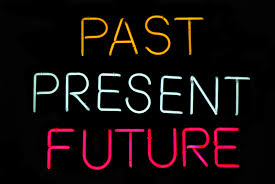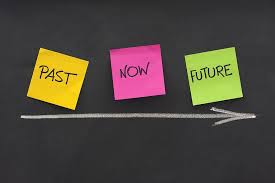Past/Present/Future Coaching Tool
 A question arising early in the coaching relationship is how are the coach and client going to spend their time together and which time will they spend this time on? Will they concentrate more on the past, looking back in anger (sadness, joy…)? Or, will they ‘seize the day’, trying to ‘go with the flow’ in the momentum of being alive and ‘open’ to the present moment? Or, might they anticipate the future, bright or otherwise, perhaps in the belief that pro-activity is crucial and failing to plan is planning to fail?
A question arising early in the coaching relationship is how are the coach and client going to spend their time together and which time will they spend this time on? Will they concentrate more on the past, looking back in anger (sadness, joy…)? Or, will they ‘seize the day’, trying to ‘go with the flow’ in the momentum of being alive and ‘open’ to the present moment? Or, might they anticipate the future, bright or otherwise, perhaps in the belief that pro-activity is crucial and failing to plan is planning to fail?
For some people, there’s no contest. It has to be the present. That’s the place to start from, ‘The past is history, the future’s a mystery, that’s why the present’s a gift’, they claim. Meditation practice focuses on the present, the here and now. The argument between the past and the future is represented by the two giants of therapeutic thinking. In the red corner, psychoanalysis insists that the present and future can only be understood in the context of the past, ’Those who cannot understand the past are condemned to repeat it’. They turn to the metaphor of archaeology claiming that any way of life is best understood by excavating and piecing together its artefacts, some of which have been deeply buried for many years.
In the blue corner, cognitive behavioural approaches argue that it is a waste of time and money to self indulgently wallow in past memories (many of which are probably spurious at best and maybe even false anyway). There’s no point crying over spilt milk. Better to concentrate on cleaning up the mess and learning how not to spill it again in future. Never mind what has happened. What do you want to happen? Start with the end in mind, plan proactively, set objectives, aims, goals and evaluate. That’s the way; forwards, not backwards… onwards, upwards…
In a therapeutic context, a therapist talked of her work with adolescents who had suffered trauma. She said, most trauma-free adolescents would see their life in terms of importance of time frames as follows
past..Present..FUTURE
The future’s the thing. Where it’s happening. What to do? Where to go? Who with? What to be (or at least what to appear to be on social networks)?
However, for those who are affected by life-changing trauma, they cannot have this hopeful, forward-looking perspective. They are condemned/confined to the past. They see the times as:
PAST..Present future.
The exercise
 If this is so, it’s important that client and coach get to know which of the three broad time frames are most important and when. If they don’t, they will be talking at cross-purposes, the time will be out of joint and they might sound like they are using a different language. The Coach can also encourage the client to “time travel” and spend time inhabiting each of these time frames to reflect on the broad canvas of their journey.
If this is so, it’s important that client and coach get to know which of the three broad time frames are most important and when. If they don’t, they will be talking at cross-purposes, the time will be out of joint and they might sound like they are using a different language. The Coach can also encourage the client to “time travel” and spend time inhabiting each of these time frames to reflect on the broad canvas of their journey.
Past, Present and Future Coaching tool covers areas of prevailing drivers, key relationships, work, and relationship with oneself as an individual.
The Coaching tool was developed jointly by David Crowe and Martin Smith.